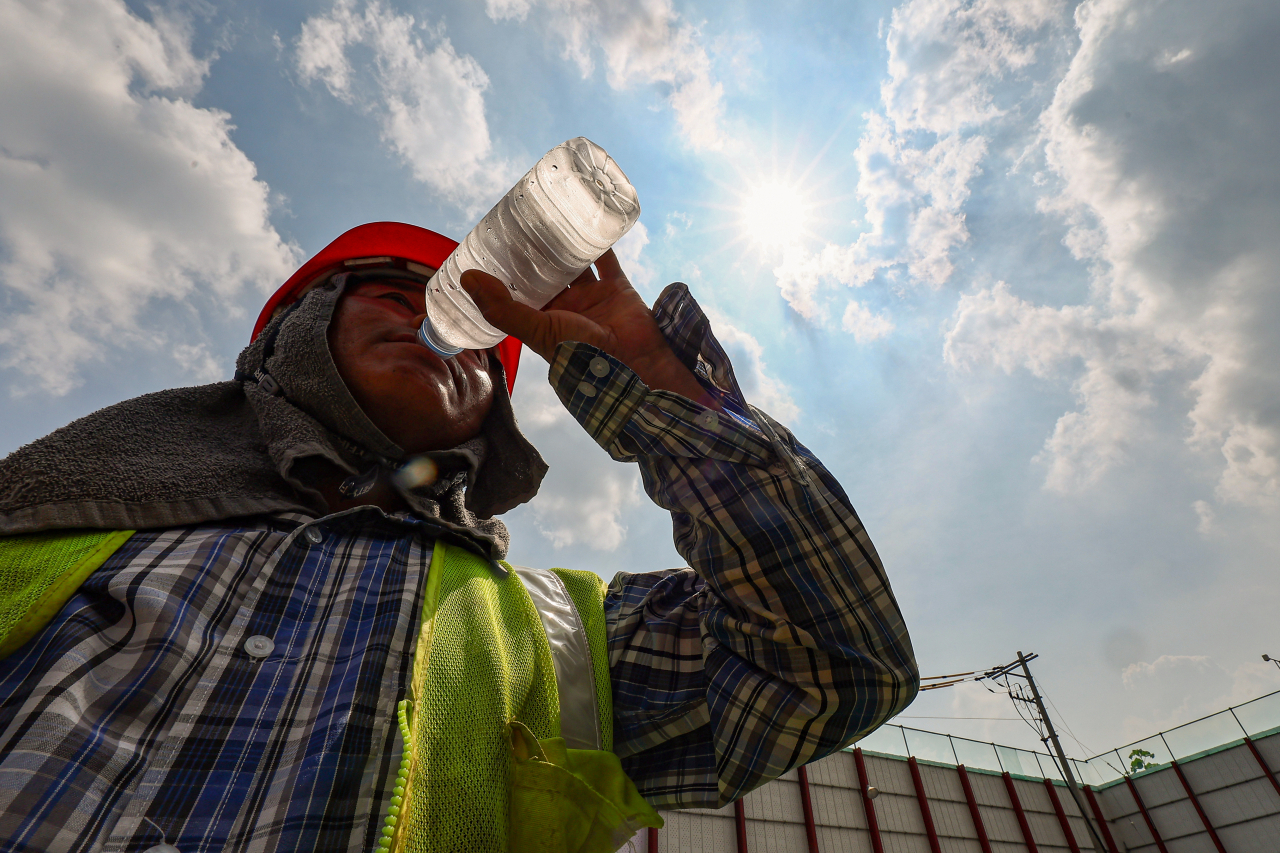Heat waves to last 12 times longer if emissions continue unabated
Study suggests daunting consequence of climate change amid growing concerns over health risks from scorching heat
By Lee Jung-younPublished : Aug. 2, 2023 - 15:35

As scorching heat and tropical nights pose growing threats to public health and economic activities, a report suggested Wednesday that the number of days on which Korea suffered extreme heat stress would surge 12-fold if climate change continues.
According to a report on the thermal stress index released by the the Korea Meteorological Administration, Korea's summer heat stress index from 1979 to 2014 averaged 28.1 degrees Celsius.
But under a climate change scenario of extensive fossil fuel use and uncontrolled urban development, South Korea's summer heat stress index will rise to 35.8 C in the latter half of this century from 2081 to 2100.
When the thermal stress index rises past 30 C, the number of patients with heat-related illnesses surges.
The thermal stress index refers to the “Wet-Bulb Globe Temperature,” an index jointly registered with the International Organization for Standardization by the World Meteorological Organization and the World Health Organization.
Wet-Bulb Globe Temperature, also called the "heat index" or "heat stress index," represents thermal stress and health risk posed by hot weather, and is calculated by considering not just temperature, but also humidity and solar radiation.
Even under the SSP1-2.6 scenario, which assumes the development of renewable energy and minimum use of fossil fuels, the average nationwide summer thermal stress index is still expected to reach 31.2 C.
The KMA also explained that there would be 12 times as many “extreme thermal stress days” under the high carbon emission scenario, reaching an average of 94.2 a year. In case of the low carbon emission scenario, the number of extremely hot days will rise more than sixfold to 48.8 days.
"Extreme thermal stress days" are days when more than 10 percent of the territory sees a thermal stress index in the top 5 percent of values for the year, defined as June, July and August. Currently, that threshold is 32.8 C.
On average, there were 7.6 such days a year from 1979 to 2014.
The report came as South Korea suffering from unprecedentedly scorching weather. The Interior Ministry raised the heat wave crisis alert level to "serious" as of 6 p.m. on Tuesday. The heat wave crisis warning stage is divided into four stages -- "attention," "caution," "warning," and "serious." It is the first time since Aug. 3, 2019, that a serious-level alert had been issued.
According to data from the Korea Centers for Disease Control and Prevention, 1,191 people suffered from heat-related illness nationwide as of Monday, and 13 deaths were believed to be caused by the extreme heat.
Fire authorities statistics showed more heat wave casualties, estimating the number of heat-related deaths at 21 as of Monday. Two more deaths were reported Tuesday, but are yet to be included in the official statistics. The figure has already exceeded last year’s official heat-related death toll, which was nine.
At the 25th World Scout Jamboree, which kicked off Tuesday in Saemangeum, North Jeolla Province, which has no natural shade, the heat wave caused more than 400 cases of heat-related illness within a day.
The Jamboree Committee said it will strengthen the cooling function of the facilities and has shortened shuttle bus waiting times from 30 minutes to 10 minutes. About 50 to 150 additional beds will be installed in the campsite's temporary hospital.
"Several (anti-heat) measures were discussed, including sufficient water and salt provision. We will do our best to secure participants' health and safety," said Choi Chang-haeng, secretary-general of the Jamboree Committee during a press briefing Wednesday.
The Labor Minister Lee Jung-sik also held an emergency meeting Tuesday and urged employers to suspend all work if there is an urgent risk of heat-related illnesses. The current law stipulates that when there is an urgent risk of an industrial accident, employers should evacuate the workplace.
The Korea Railroad Corporation has slowed down train speeds as of Wednesday, as the immense heat could bend or damage the tracks. When the temperature of the tracks goes over 50 to 55 C, high-speed trains slow down to 230 kilometers per hour, and regular trains slow down to 60 kilometers per hour.



















